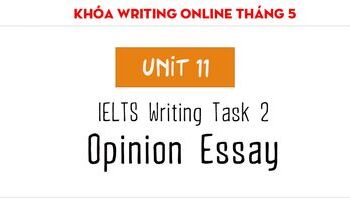Ở bài học IELTS Writing trước, các bạn đã học tổng quan về IELTS Writing Task 2 với những dạng bài thường xuất hiện nhất. Ở bài học này, chúng ta sẽ học về đầu tiên đó là Opinion Essay.
Trong bài giảng này chúng mình sẽ cung cấp cho các bạn đầy đủ thông tin, cách làm bài để đối phó với dạng bài học khó nhằn này nhé!
Video học Opinion Essay
Cách viết bài Opinion Essay
1. Understanding the task
Đề bài: Some educators believe that every child should be taught how to play a musical instrument.
To what extent do you agree or disagree?
General structure:
Introduction:
- Paraphrase the provided opinion
- Thesis statement: clearly state the writer’s stance/ viewpoint
2 Body paragraphs:
- Clarify and support the writer’s viewpoint
- Give reasons + examples
Conclusion:
Summarize the main ideas
2. Brainstorming
Agree:
- Discover musical geniuses
- A positive pastime favoured by parents
Disagree:
- Unfair, pointless for the majority
- Hectic schedule => more stressed
Bài mẫu sẽ viết theo hướng Disagree
- Common strategy: straight forward agree/disagree, give many reasons:
First, Second, Moreover, Furthermore,…
- A clever strategy: “Disagree” by countering all the main ideas of “Agree”
It is understandable why they think …
However, I think …
3. Sample Answer
Many educators hold a belief that it is necessary for all children to learn how to play a musical instrument. Despite the theoretical benefits of this proposal, particularly discovering young musical talents and a potentially positive pastime for children, it cannot be accepted due to the rarity of musical geniuses and nowadays students’ hectic schedules.
For once, it is understandable why scholars, teachers, or parents believe that playing a musical instrument is beneficial for children. First, geniuses with musical talent can be discovered from an early age and developed into professional musicians. Dang Thai Son, who learned the piano with his mother from the age of 6 and later became the most successful Vietnamese pianist, is an excellent example. Furthermore, in the eyes of adults, musical training can be a positive hobby and potentially replace computer games. My aunt, for instance, is always bragging about her 12-year-old son who practices the guitar in his spare time while his classmates play games. She believes that it will enrich his soul with subtle feelings and allow him to relax after school.
However, my personal opinion is against this proposal due to the following reasons. To begin with, there is a fact that musical talents are rare. Therefore, if all children were required to learn musical instruments, it would be unfair and pointless for most ordinary children who are neither naturally gifted nor interested in musical training. Moreover, children these days are already up to their ears with homework and deadlines. For instance, most high school students in Vietnam go to school all day and to some extra classes in the evening and even on weekends. As a result, adding musical training into their already crammed timetables would definitely make them feel more overloaded and stressed.
In conclusion, although learning to play musical instruments can bring some benefits, it is not advisable to implement this proposal in reality.
(318 words, band 7.0)
4. Useful structures
Introduction
- S + hold a belief that + clause: paraphrase ý kiến/quan điểm đề bài
- Despite the theoretical benefits of this proposal, particularly N and N: thừa nhận sự tồn tại của một số lợi ích trên lý thuyết, lí do tại sao nhiều người nghĩ vậy …
- …it cannot be accepted due to N1 and N2: phản đối và đưa ra các lí do của người viết
Admission and Counter
- It is understandable why someone believe that + clause: thừa nhận và paraphrase ý kiến/quan điểm của 1 số người mà đề bài đã cho
- However, my personal opinion is against…: đưa ra ý kiến của mình để phản biện
- Sth cannot be accepted/ my opinion is against sth/ it is not advisable to do sth: paraphrase từ disagree
Present and Explain ideas
- For once, First, To begin with: đầu tiên (main idea thứ nhất)
- Moreover, Furthermore: hơn thế nữa (main idea tiếp theo)
- Therefore, As a result: vì vậy (kết quả)
- However, Nevertheless: ngược lại (đưa ra idea trái ngược)
Luyện tập
Brainstorming với đề thi thật chủ đề Education, bạn cùng phân tích rồi viết bài cho riêng mình nhé.
Đề bài: Some people believe that university tuition fees should be free for all students.
To what extent do you agree or disagree? (Jan, 2023)
Brainstorming: đây là một đề bài rất thú vị thuộc dạng Opinion/ Agree or Disagree. Để giải được dạng đề này, trước hết chúng ta cần giữ thái độ trung lập (neutral) và nghĩ ra những hướng giải thích của cả 2 phía, rồi sau đó mới căn cứ vào các ý tưởng và ví dụ có trong tay để phân tích và kết luận.
Các lý do Agree:
- Phát triển xã hội
Tạo ra công bằng xã hội (Social equality). Giải thích: không còn tuition fees, học sinh có hoàn cảnh khó khăn (underprivileged, from low social and economic backgrounds) cũng có thể tiếp cận với giáo dục bậc cao và kiến thức, tư đó có được việc làm, thu nhập, và mức sống tốt hơn => thu hẹp khoảng cách giàu nghèo trong xã hội.
Nâng cao Dân trí (wisdom of the crowd). Giải thích: số người được tiếp cận giáo dục đại học nhiều hơn => ngày càng nhiều người hiểu biết về các lĩnh vực như khoa học, pháp luật => xã hội phát triển
- Phát triển kinh tế (economic growth)
Giải thích: lực lượng lao động có trình độ cao (advanced, skilled, well-educated and well-trained workforce) => hiệu quả công việc (work efficiency) tăng cao trong hầu hết các ngành/ lĩnh vực => phát triển kinh tế nhanh hơn
Các lý do Disagree
- Các vấn đề tài chính (Financial issues)
Giải thích: các cở sở giáo dục đại học (tertiary educational institutions) mất 1 nguồn income lớn, có thể sẽ không đủ trang trải (cover the expenses) các chi phí xây dựng và mở rộng cơ sở hạ tầng (construct and expand infrastructure), cơ sở vật chất dạy và học (facilities and materials for teaching and learning), lương cho cán bộ công nhân viên (staff’s salaries); ko tạo ra lợi nhuận cho các nhà đầu tư (not profitable); gây thêm gánh nặng lên ngân sách quốc gia (more burden on the national budget)
(Tuy nhiên, luận điểm này hoàn toàn có thể bị phản biện với hàng loạt ví dụ về giáo dục miễn phí tại các quốc gia đã phát triển (developed countries) như Phần Lan, Thụy Điển, Đan Mạch, Đức, cho đến các quốc gia không quá giàu có như Cuba, Uruguay, Brazil, Arghentina. Lý do rất đơn giản: nhà nước dành 1 phần lớn ngân sách quốc gia để đầu tư cho giáo dục và vẫn cân đối được chi tiêu cho các lĩnh vực khác.)
Vậy còn các bạn thì sao? Hãy thử luyện viết với chủ đề này nhé.
Tham khảo bài học khác:
- Cách viết IELTS writing task 1 Từ A - Z cho người bắt đầu
- Hướng dẫn viết IELTS Writing cho người mới bắt đầu
Chúc các bạn học tốt ^-^





